Analysis of Contract and Company Law: Law for Business Managers
VerifiedAdded on 2023/06/07
|8
|2382
|114
Report
AI Summary
This report provides an analysis of business law, focusing on contract law and company law. It examines the essential elements of a valid contract, including offer, acceptance, consideration, and intention to create legal relations. The report includes a case scenario demonstrating the application of contract law, specifically addressing the enforceability of a promise of reward. Furthermore, it delves into the landmark case of Solomon versus Solomon & Co. Ltd., discussing the rule of separate legal entity and its exceptions, such as piercing the corporate veil and evasion principles. The report concludes by highlighting the importance of company law in determining a company's legal status, rights, and liabilities, emphasizing the distinction between a company and its members under the principle of separate legal entity. Desklib provides students access to similar solved assignments and past papers.
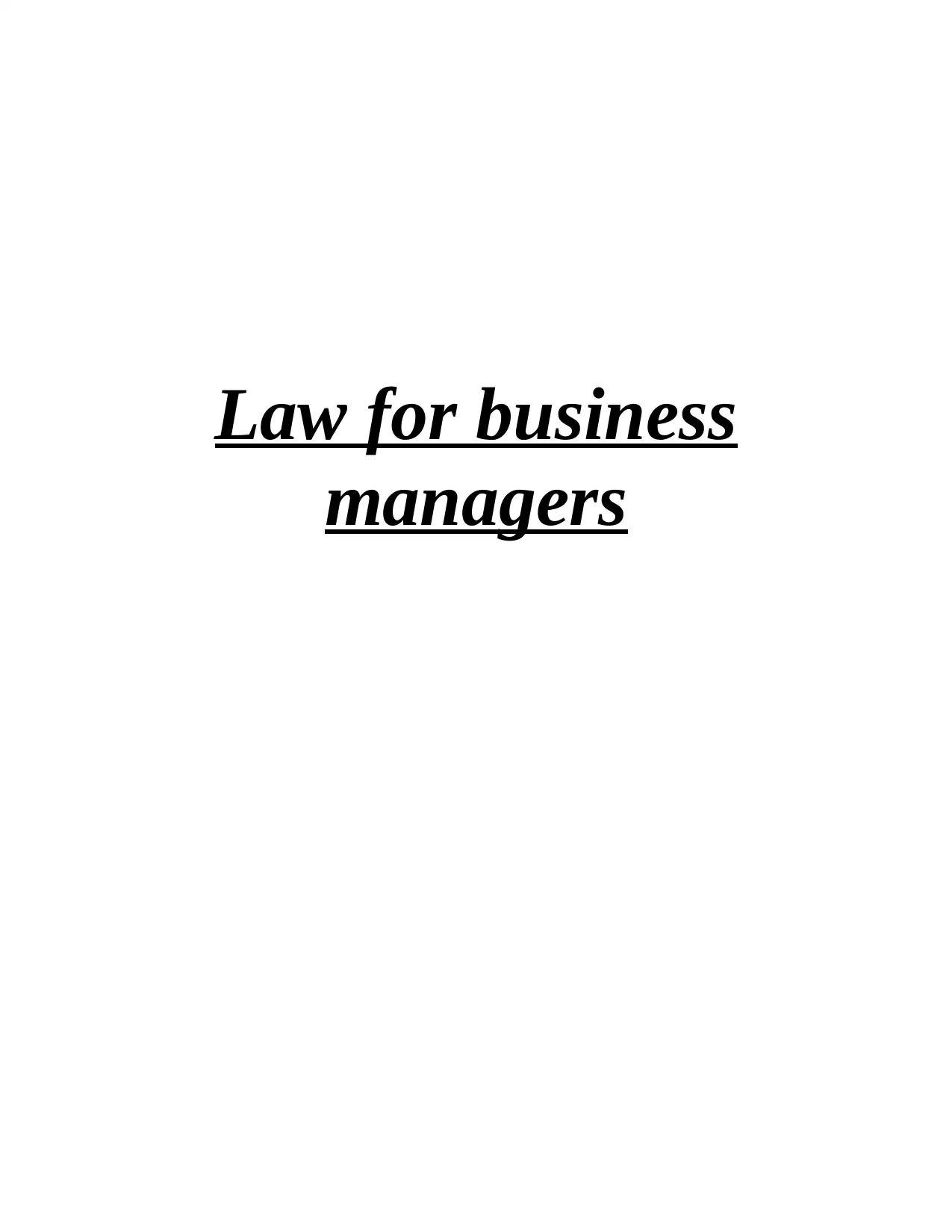
Law for business
managers
managers
Paraphrase This Document
Need a fresh take? Get an instant paraphrase of this document with our AI Paraphraser

Table of Contents
INTRODUCTION ..........................................................................................................................2
CONCLUSION ...............................................................................................................................6
REFERENCES................................................................................................................................8
INTRODUCTION ..........................................................................................................................2
CONCLUSION ...............................................................................................................................6
REFERENCES................................................................................................................................8
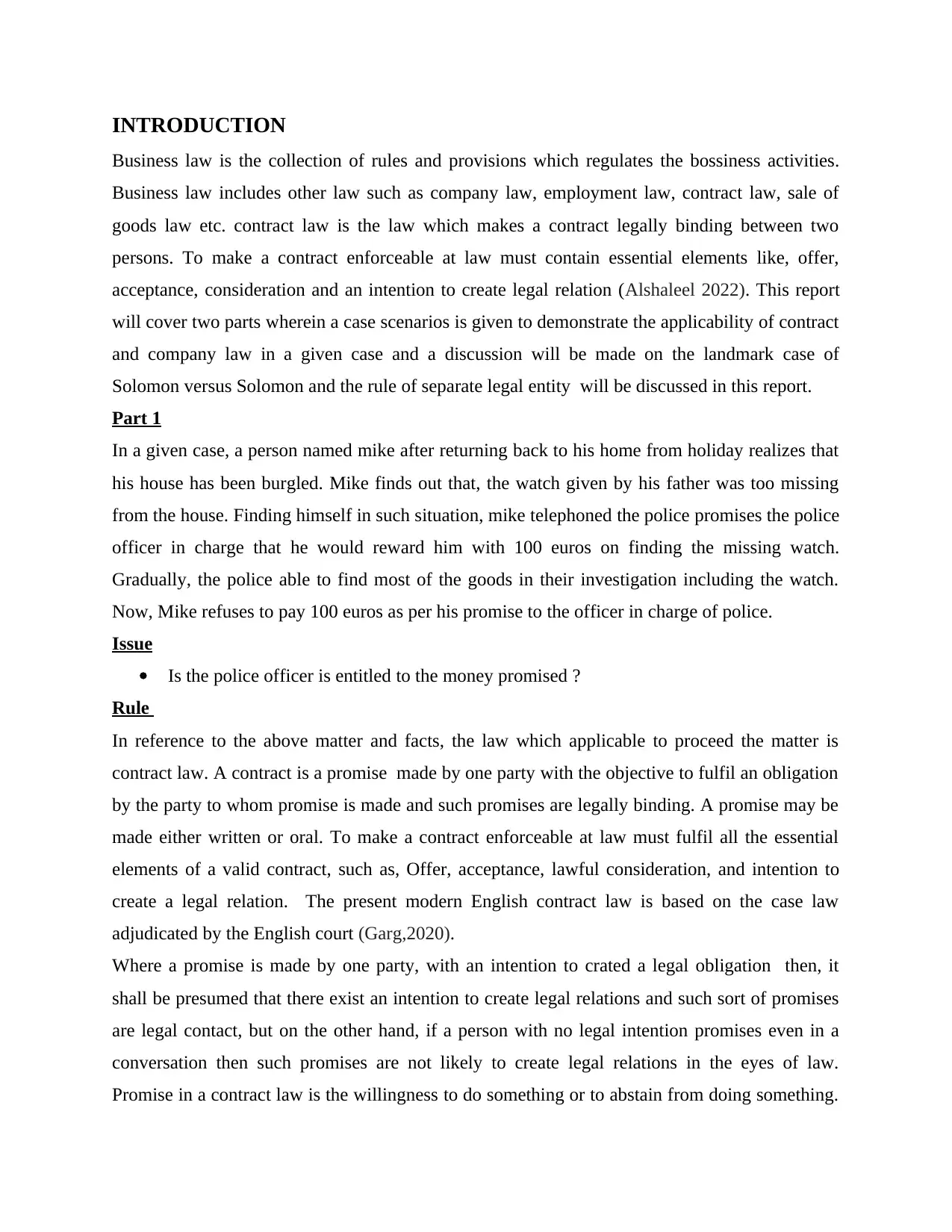
INTRODUCTION
Business law is the collection of rules and provisions which regulates the bossiness activities.
Business law includes other law such as company law, employment law, contract law, sale of
goods law etc. contract law is the law which makes a contract legally binding between two
persons. To make a contract enforceable at law must contain essential elements like, offer,
acceptance, consideration and an intention to create legal relation (Alshaleel 2022). This report
will cover two parts wherein a case scenarios is given to demonstrate the applicability of contract
and company law in a given case and a discussion will be made on the landmark case of
Solomon versus Solomon and the rule of separate legal entity will be discussed in this report.
Part 1
In a given case, a person named mike after returning back to his home from holiday realizes that
his house has been burgled. Mike finds out that, the watch given by his father was too missing
from the house. Finding himself in such situation, mike telephoned the police promises the police
officer in charge that he would reward him with 100 euros on finding the missing watch.
Gradually, the police able to find most of the goods in their investigation including the watch.
Now, Mike refuses to pay 100 euros as per his promise to the officer in charge of police.
Issue
Is the police officer is entitled to the money promised ?
Rule
In reference to the above matter and facts, the law which applicable to proceed the matter is
contract law. A contract is a promise made by one party with the objective to fulfil an obligation
by the party to whom promise is made and such promises are legally binding. A promise may be
made either written or oral. To make a contract enforceable at law must fulfil all the essential
elements of a valid contract, such as, Offer, acceptance, lawful consideration, and intention to
create a legal relation. The present modern English contract law is based on the case law
adjudicated by the English court (Garg,2020).
Where a promise is made by one party, with an intention to crated a legal obligation then, it
shall be presumed that there exist an intention to create legal relations and such sort of promises
are legal contact, but on the other hand, if a person with no legal intention promises even in a
conversation then such promises are not likely to create legal relations in the eyes of law.
Promise in a contract law is the willingness to do something or to abstain from doing something.
Business law is the collection of rules and provisions which regulates the bossiness activities.
Business law includes other law such as company law, employment law, contract law, sale of
goods law etc. contract law is the law which makes a contract legally binding between two
persons. To make a contract enforceable at law must contain essential elements like, offer,
acceptance, consideration and an intention to create legal relation (Alshaleel 2022). This report
will cover two parts wherein a case scenarios is given to demonstrate the applicability of contract
and company law in a given case and a discussion will be made on the landmark case of
Solomon versus Solomon and the rule of separate legal entity will be discussed in this report.
Part 1
In a given case, a person named mike after returning back to his home from holiday realizes that
his house has been burgled. Mike finds out that, the watch given by his father was too missing
from the house. Finding himself in such situation, mike telephoned the police promises the police
officer in charge that he would reward him with 100 euros on finding the missing watch.
Gradually, the police able to find most of the goods in their investigation including the watch.
Now, Mike refuses to pay 100 euros as per his promise to the officer in charge of police.
Issue
Is the police officer is entitled to the money promised ?
Rule
In reference to the above matter and facts, the law which applicable to proceed the matter is
contract law. A contract is a promise made by one party with the objective to fulfil an obligation
by the party to whom promise is made and such promises are legally binding. A promise may be
made either written or oral. To make a contract enforceable at law must fulfil all the essential
elements of a valid contract, such as, Offer, acceptance, lawful consideration, and intention to
create a legal relation. The present modern English contract law is based on the case law
adjudicated by the English court (Garg,2020).
Where a promise is made by one party, with an intention to crated a legal obligation then, it
shall be presumed that there exist an intention to create legal relations and such sort of promises
are legal contact, but on the other hand, if a person with no legal intention promises even in a
conversation then such promises are not likely to create legal relations in the eyes of law.
Promise in a contract law is the willingness to do something or to abstain from doing something.
⊘ This is a preview!⊘
Do you want full access?
Subscribe today to unlock all pages.

Trusted by 1+ million students worldwide
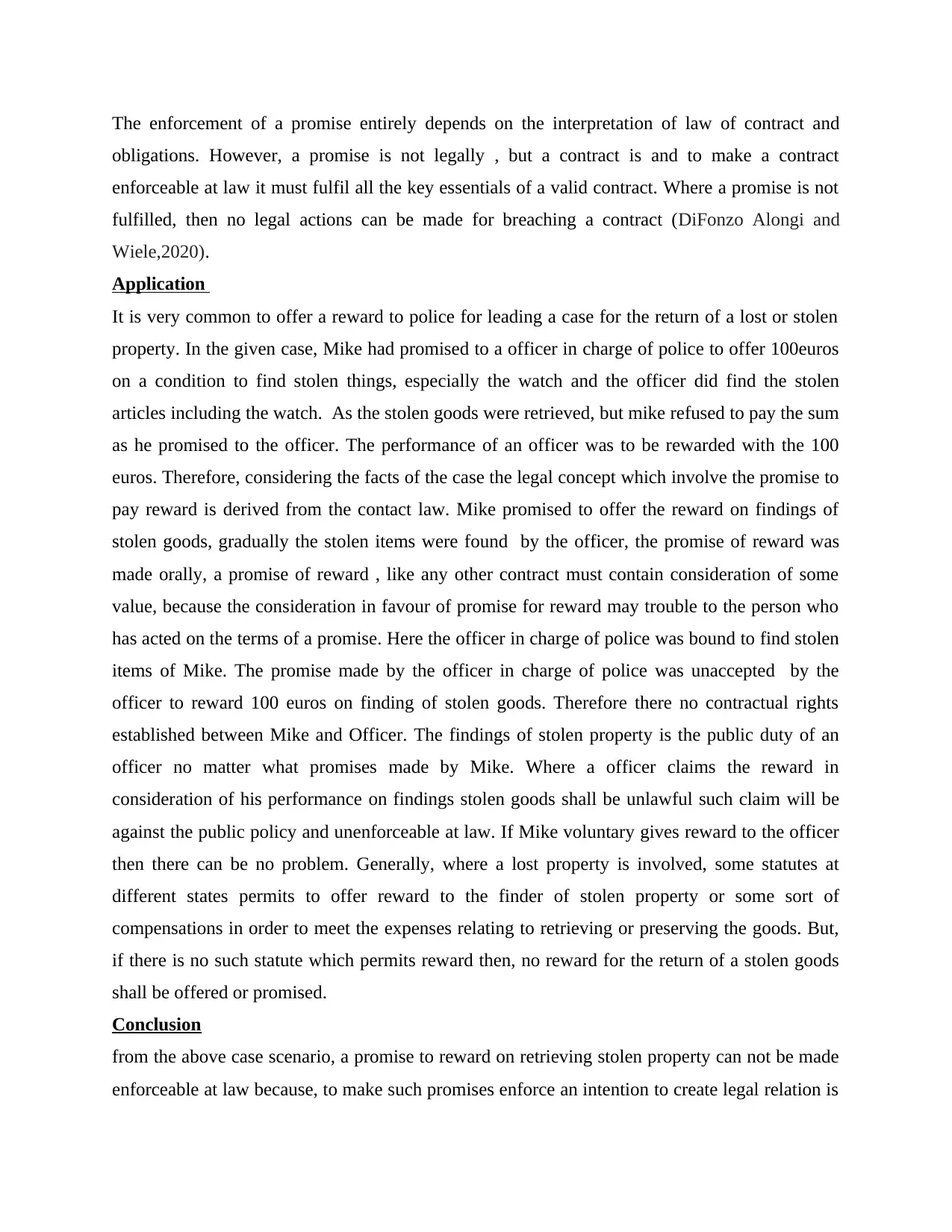
The enforcement of a promise entirely depends on the interpretation of law of contract and
obligations. However, a promise is not legally , but a contract is and to make a contract
enforceable at law it must fulfil all the key essentials of a valid contract. Where a promise is not
fulfilled, then no legal actions can be made for breaching a contract (DiFonzo Alongi and
Wiele,2020).
Application
It is very common to offer a reward to police for leading a case for the return of a lost or stolen
property. In the given case, Mike had promised to a officer in charge of police to offer 100euros
on a condition to find stolen things, especially the watch and the officer did find the stolen
articles including the watch. As the stolen goods were retrieved, but mike refused to pay the sum
as he promised to the officer. The performance of an officer was to be rewarded with the 100
euros. Therefore, considering the facts of the case the legal concept which involve the promise to
pay reward is derived from the contact law. Mike promised to offer the reward on findings of
stolen goods, gradually the stolen items were found by the officer, the promise of reward was
made orally, a promise of reward , like any other contract must contain consideration of some
value, because the consideration in favour of promise for reward may trouble to the person who
has acted on the terms of a promise. Here the officer in charge of police was bound to find stolen
items of Mike. The promise made by the officer in charge of police was unaccepted by the
officer to reward 100 euros on finding of stolen goods. Therefore there no contractual rights
established between Mike and Officer. The findings of stolen property is the public duty of an
officer no matter what promises made by Mike. Where a officer claims the reward in
consideration of his performance on findings stolen goods shall be unlawful such claim will be
against the public policy and unenforceable at law. If Mike voluntary gives reward to the officer
then there can be no problem. Generally, where a lost property is involved, some statutes at
different states permits to offer reward to the finder of stolen property or some sort of
compensations in order to meet the expenses relating to retrieving or preserving the goods. But,
if there is no such statute which permits reward then, no reward for the return of a stolen goods
shall be offered or promised.
Conclusion
from the above case scenario, a promise to reward on retrieving stolen property can not be made
enforceable at law because, to make such promises enforce an intention to create legal relation is
obligations. However, a promise is not legally , but a contract is and to make a contract
enforceable at law it must fulfil all the key essentials of a valid contract. Where a promise is not
fulfilled, then no legal actions can be made for breaching a contract (DiFonzo Alongi and
Wiele,2020).
Application
It is very common to offer a reward to police for leading a case for the return of a lost or stolen
property. In the given case, Mike had promised to a officer in charge of police to offer 100euros
on a condition to find stolen things, especially the watch and the officer did find the stolen
articles including the watch. As the stolen goods were retrieved, but mike refused to pay the sum
as he promised to the officer. The performance of an officer was to be rewarded with the 100
euros. Therefore, considering the facts of the case the legal concept which involve the promise to
pay reward is derived from the contact law. Mike promised to offer the reward on findings of
stolen goods, gradually the stolen items were found by the officer, the promise of reward was
made orally, a promise of reward , like any other contract must contain consideration of some
value, because the consideration in favour of promise for reward may trouble to the person who
has acted on the terms of a promise. Here the officer in charge of police was bound to find stolen
items of Mike. The promise made by the officer in charge of police was unaccepted by the
officer to reward 100 euros on finding of stolen goods. Therefore there no contractual rights
established between Mike and Officer. The findings of stolen property is the public duty of an
officer no matter what promises made by Mike. Where a officer claims the reward in
consideration of his performance on findings stolen goods shall be unlawful such claim will be
against the public policy and unenforceable at law. If Mike voluntary gives reward to the officer
then there can be no problem. Generally, where a lost property is involved, some statutes at
different states permits to offer reward to the finder of stolen property or some sort of
compensations in order to meet the expenses relating to retrieving or preserving the goods. But,
if there is no such statute which permits reward then, no reward for the return of a stolen goods
shall be offered or promised.
Conclusion
from the above case scenario, a promise to reward on retrieving stolen property can not be made
enforceable at law because, to make such promises enforce an intention to create legal relation is
Paraphrase This Document
Need a fresh take? Get an instant paraphrase of this document with our AI Paraphraser
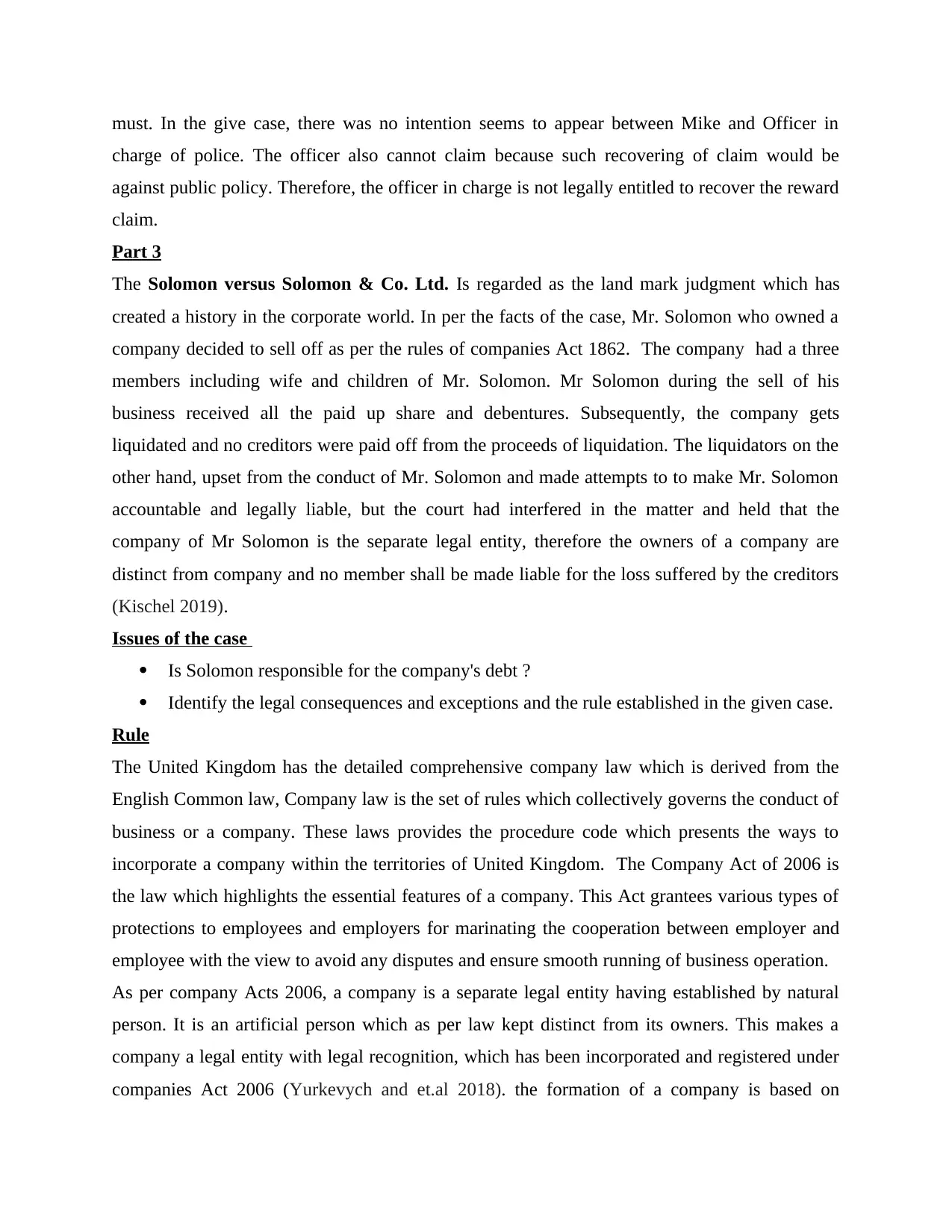
must. In the give case, there was no intention seems to appear between Mike and Officer in
charge of police. The officer also cannot claim because such recovering of claim would be
against public policy. Therefore, the officer in charge is not legally entitled to recover the reward
claim.
Part 3
The Solomon versus Solomon & Co. Ltd. Is regarded as the land mark judgment which has
created a history in the corporate world. In per the facts of the case, Mr. Solomon who owned a
company decided to sell off as per the rules of companies Act 1862. The company had a three
members including wife and children of Mr. Solomon. Mr Solomon during the sell of his
business received all the paid up share and debentures. Subsequently, the company gets
liquidated and no creditors were paid off from the proceeds of liquidation. The liquidators on the
other hand, upset from the conduct of Mr. Solomon and made attempts to to make Mr. Solomon
accountable and legally liable, but the court had interfered in the matter and held that the
company of Mr Solomon is the separate legal entity, therefore the owners of a company are
distinct from company and no member shall be made liable for the loss suffered by the creditors
(Kischel 2019).
Issues of the case
Is Solomon responsible for the company's debt ?
Identify the legal consequences and exceptions and the rule established in the given case.
Rule
The United Kingdom has the detailed comprehensive company law which is derived from the
English Common law, Company law is the set of rules which collectively governs the conduct of
business or a company. These laws provides the procedure code which presents the ways to
incorporate a company within the territories of United Kingdom. The Company Act of 2006 is
the law which highlights the essential features of a company. This Act grantees various types of
protections to employees and employers for marinating the cooperation between employer and
employee with the view to avoid any disputes and ensure smooth running of business operation.
As per company Acts 2006, a company is a separate legal entity having established by natural
person. It is an artificial person which as per law kept distinct from its owners. This makes a
company a legal entity with legal recognition, which has been incorporated and registered under
companies Act 2006 (Yurkevych and et.al 2018). the formation of a company is based on
charge of police. The officer also cannot claim because such recovering of claim would be
against public policy. Therefore, the officer in charge is not legally entitled to recover the reward
claim.
Part 3
The Solomon versus Solomon & Co. Ltd. Is regarded as the land mark judgment which has
created a history in the corporate world. In per the facts of the case, Mr. Solomon who owned a
company decided to sell off as per the rules of companies Act 1862. The company had a three
members including wife and children of Mr. Solomon. Mr Solomon during the sell of his
business received all the paid up share and debentures. Subsequently, the company gets
liquidated and no creditors were paid off from the proceeds of liquidation. The liquidators on the
other hand, upset from the conduct of Mr. Solomon and made attempts to to make Mr. Solomon
accountable and legally liable, but the court had interfered in the matter and held that the
company of Mr Solomon is the separate legal entity, therefore the owners of a company are
distinct from company and no member shall be made liable for the loss suffered by the creditors
(Kischel 2019).
Issues of the case
Is Solomon responsible for the company's debt ?
Identify the legal consequences and exceptions and the rule established in the given case.
Rule
The United Kingdom has the detailed comprehensive company law which is derived from the
English Common law, Company law is the set of rules which collectively governs the conduct of
business or a company. These laws provides the procedure code which presents the ways to
incorporate a company within the territories of United Kingdom. The Company Act of 2006 is
the law which highlights the essential features of a company. This Act grantees various types of
protections to employees and employers for marinating the cooperation between employer and
employee with the view to avoid any disputes and ensure smooth running of business operation.
As per company Acts 2006, a company is a separate legal entity having established by natural
person. It is an artificial person which as per law kept distinct from its owners. This makes a
company a legal entity with legal recognition, which has been incorporated and registered under
companies Act 2006 (Yurkevych and et.al 2018). the formation of a company is based on
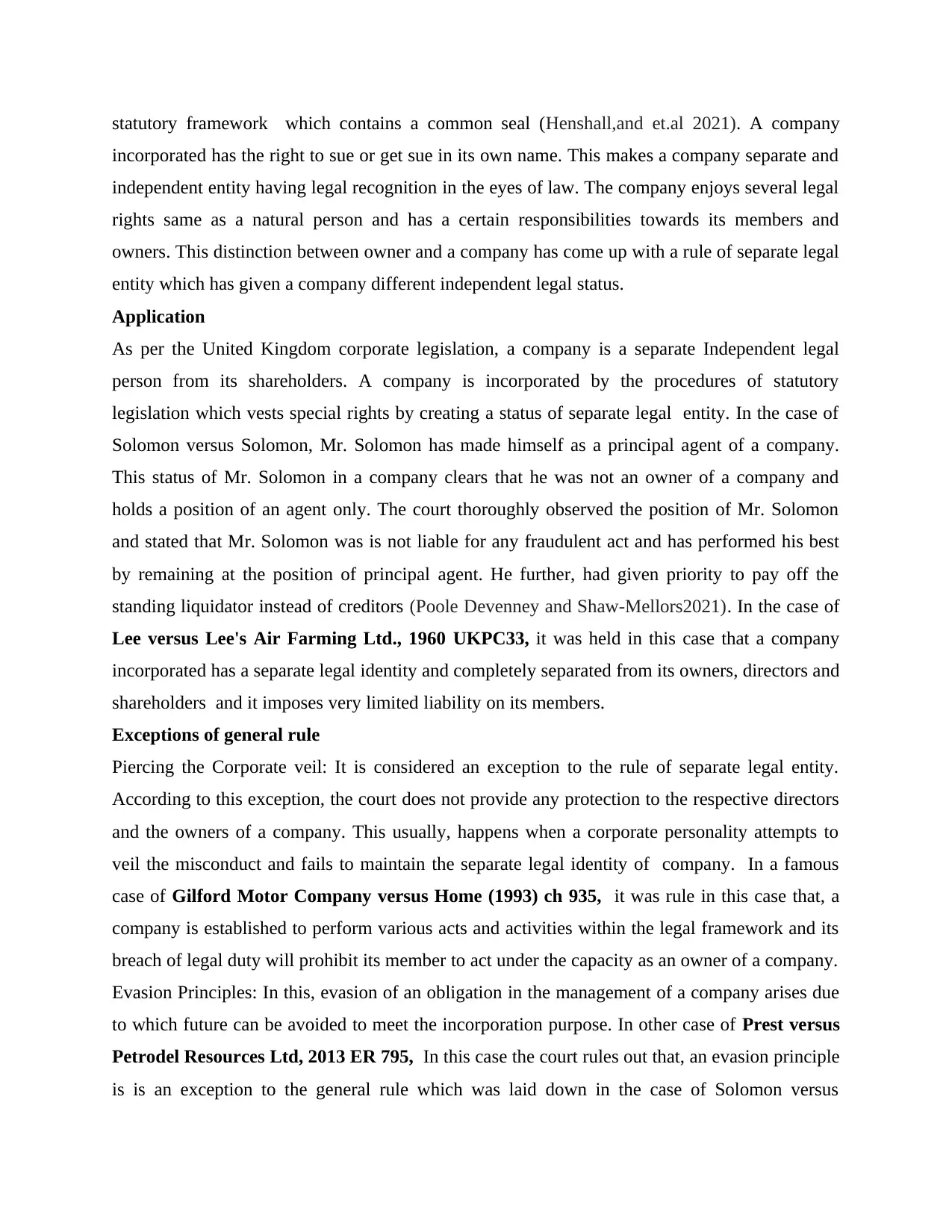
statutory framework which contains a common seal (Henshall,and et.al 2021). A company
incorporated has the right to sue or get sue in its own name. This makes a company separate and
independent entity having legal recognition in the eyes of law. The company enjoys several legal
rights same as a natural person and has a certain responsibilities towards its members and
owners. This distinction between owner and a company has come up with a rule of separate legal
entity which has given a company different independent legal status.
Application
As per the United Kingdom corporate legislation, a company is a separate Independent legal
person from its shareholders. A company is incorporated by the procedures of statutory
legislation which vests special rights by creating a status of separate legal entity. In the case of
Solomon versus Solomon, Mr. Solomon has made himself as a principal agent of a company.
This status of Mr. Solomon in a company clears that he was not an owner of a company and
holds a position of an agent only. The court thoroughly observed the position of Mr. Solomon
and stated that Mr. Solomon was is not liable for any fraudulent act and has performed his best
by remaining at the position of principal agent. He further, had given priority to pay off the
standing liquidator instead of creditors (Poole Devenney and Shaw-Mellors2021). In the case of
Lee versus Lee's Air Farming Ltd., 1960 UKPC33, it was held in this case that a company
incorporated has a separate legal identity and completely separated from its owners, directors and
shareholders and it imposes very limited liability on its members.
Exceptions of general rule
Piercing the Corporate veil: It is considered an exception to the rule of separate legal entity.
According to this exception, the court does not provide any protection to the respective directors
and the owners of a company. This usually, happens when a corporate personality attempts to
veil the misconduct and fails to maintain the separate legal identity of company. In a famous
case of Gilford Motor Company versus Home (1993) ch 935, it was rule in this case that, a
company is established to perform various acts and activities within the legal framework and its
breach of legal duty will prohibit its member to act under the capacity as an owner of a company.
Evasion Principles: In this, evasion of an obligation in the management of a company arises due
to which future can be avoided to meet the incorporation purpose. In other case of Prest versus
Petrodel Resources Ltd, 2013 ER 795, In this case the court rules out that, an evasion principle
is is an exception to the general rule which was laid down in the case of Solomon versus
incorporated has the right to sue or get sue in its own name. This makes a company separate and
independent entity having legal recognition in the eyes of law. The company enjoys several legal
rights same as a natural person and has a certain responsibilities towards its members and
owners. This distinction between owner and a company has come up with a rule of separate legal
entity which has given a company different independent legal status.
Application
As per the United Kingdom corporate legislation, a company is a separate Independent legal
person from its shareholders. A company is incorporated by the procedures of statutory
legislation which vests special rights by creating a status of separate legal entity. In the case of
Solomon versus Solomon, Mr. Solomon has made himself as a principal agent of a company.
This status of Mr. Solomon in a company clears that he was not an owner of a company and
holds a position of an agent only. The court thoroughly observed the position of Mr. Solomon
and stated that Mr. Solomon was is not liable for any fraudulent act and has performed his best
by remaining at the position of principal agent. He further, had given priority to pay off the
standing liquidator instead of creditors (Poole Devenney and Shaw-Mellors2021). In the case of
Lee versus Lee's Air Farming Ltd., 1960 UKPC33, it was held in this case that a company
incorporated has a separate legal identity and completely separated from its owners, directors and
shareholders and it imposes very limited liability on its members.
Exceptions of general rule
Piercing the Corporate veil: It is considered an exception to the rule of separate legal entity.
According to this exception, the court does not provide any protection to the respective directors
and the owners of a company. This usually, happens when a corporate personality attempts to
veil the misconduct and fails to maintain the separate legal identity of company. In a famous
case of Gilford Motor Company versus Home (1993) ch 935, it was rule in this case that, a
company is established to perform various acts and activities within the legal framework and its
breach of legal duty will prohibit its member to act under the capacity as an owner of a company.
Evasion Principles: In this, evasion of an obligation in the management of a company arises due
to which future can be avoided to meet the incorporation purpose. In other case of Prest versus
Petrodel Resources Ltd, 2013 ER 795, In this case the court rules out that, an evasion principle
is is an exception to the general rule which was laid down in the case of Solomon versus
⊘ This is a preview!⊘
Do you want full access?
Subscribe today to unlock all pages.

Trusted by 1+ million students worldwide
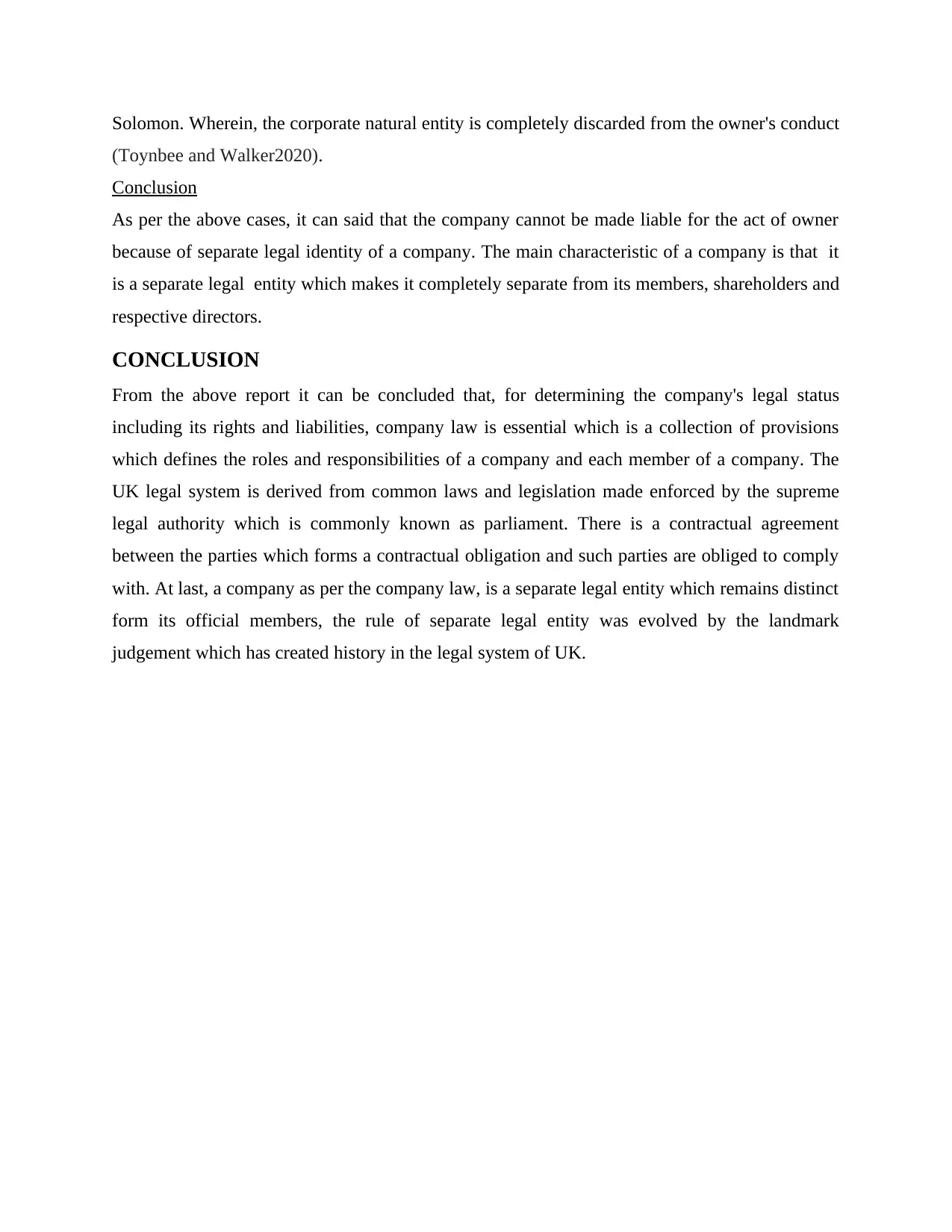
Solomon. Wherein, the corporate natural entity is completely discarded from the owner's conduct
(Toynbee and Walker2020).
Conclusion
As per the above cases, it can said that the company cannot be made liable for the act of owner
because of separate legal identity of a company. The main characteristic of a company is that it
is a separate legal entity which makes it completely separate from its members, shareholders and
respective directors.
CONCLUSION
From the above report it can be concluded that, for determining the company's legal status
including its rights and liabilities, company law is essential which is a collection of provisions
which defines the roles and responsibilities of a company and each member of a company. The
UK legal system is derived from common laws and legislation made enforced by the supreme
legal authority which is commonly known as parliament. There is a contractual agreement
between the parties which forms a contractual obligation and such parties are obliged to comply
with. At last, a company as per the company law, is a separate legal entity which remains distinct
form its official members, the rule of separate legal entity was evolved by the landmark
judgement which has created history in the legal system of UK.
(Toynbee and Walker2020).
Conclusion
As per the above cases, it can said that the company cannot be made liable for the act of owner
because of separate legal identity of a company. The main characteristic of a company is that it
is a separate legal entity which makes it completely separate from its members, shareholders and
respective directors.
CONCLUSION
From the above report it can be concluded that, for determining the company's legal status
including its rights and liabilities, company law is essential which is a collection of provisions
which defines the roles and responsibilities of a company and each member of a company. The
UK legal system is derived from common laws and legislation made enforced by the supreme
legal authority which is commonly known as parliament. There is a contractual agreement
between the parties which forms a contractual obligation and such parties are obliged to comply
with. At last, a company as per the company law, is a separate legal entity which remains distinct
form its official members, the rule of separate legal entity was evolved by the landmark
judgement which has created history in the legal system of UK.
Paraphrase This Document
Need a fresh take? Get an instant paraphrase of this document with our AI Paraphraser
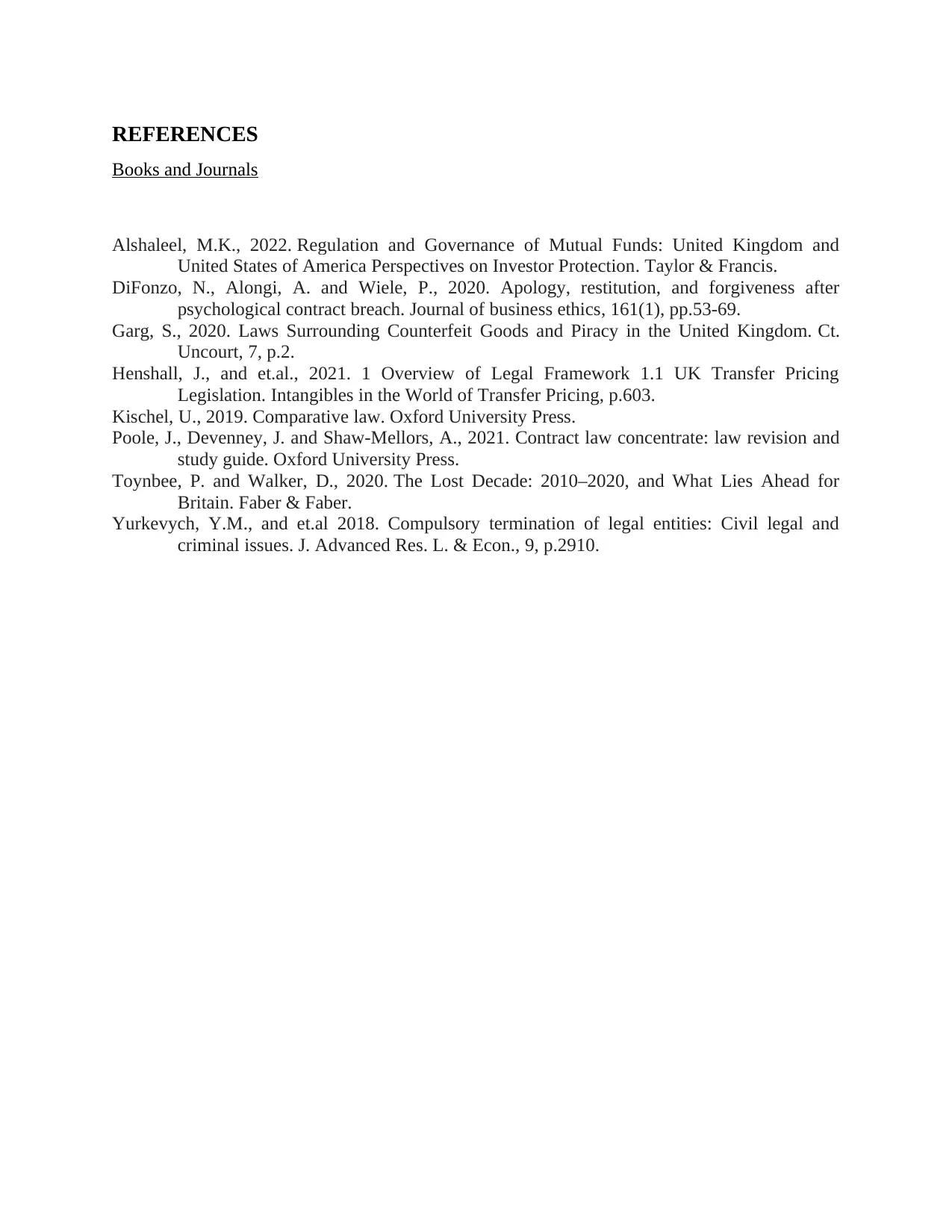
REFERENCES
Books and Journals
Alshaleel, M.K., 2022. Regulation and Governance of Mutual Funds: United Kingdom and
United States of America Perspectives on Investor Protection. Taylor & Francis.
DiFonzo, N., Alongi, A. and Wiele, P., 2020. Apology, restitution, and forgiveness after
psychological contract breach. Journal of business ethics, 161(1), pp.53-69.
Garg, S., 2020. Laws Surrounding Counterfeit Goods and Piracy in the United Kingdom. Ct.
Uncourt, 7, p.2.
Henshall, J., and et.al., 2021. 1 Overview of Legal Framework 1.1 UK Transfer Pricing
Legislation. Intangibles in the World of Transfer Pricing, p.603.
Kischel, U., 2019. Comparative law. Oxford University Press.
Poole, J., Devenney, J. and Shaw-Mellors, A., 2021. Contract law concentrate: law revision and
study guide. Oxford University Press.
Toynbee, P. and Walker, D., 2020. The Lost Decade: 2010–2020, and What Lies Ahead for
Britain. Faber & Faber.
Yurkevych, Y.M., and et.al 2018. Compulsory termination of legal entities: Civil legal and
criminal issues. J. Advanced Res. L. & Econ., 9, p.2910.
Books and Journals
Alshaleel, M.K., 2022. Regulation and Governance of Mutual Funds: United Kingdom and
United States of America Perspectives on Investor Protection. Taylor & Francis.
DiFonzo, N., Alongi, A. and Wiele, P., 2020. Apology, restitution, and forgiveness after
psychological contract breach. Journal of business ethics, 161(1), pp.53-69.
Garg, S., 2020. Laws Surrounding Counterfeit Goods and Piracy in the United Kingdom. Ct.
Uncourt, 7, p.2.
Henshall, J., and et.al., 2021. 1 Overview of Legal Framework 1.1 UK Transfer Pricing
Legislation. Intangibles in the World of Transfer Pricing, p.603.
Kischel, U., 2019. Comparative law. Oxford University Press.
Poole, J., Devenney, J. and Shaw-Mellors, A., 2021. Contract law concentrate: law revision and
study guide. Oxford University Press.
Toynbee, P. and Walker, D., 2020. The Lost Decade: 2010–2020, and What Lies Ahead for
Britain. Faber & Faber.
Yurkevych, Y.M., and et.al 2018. Compulsory termination of legal entities: Civil legal and
criminal issues. J. Advanced Res. L. & Econ., 9, p.2910.
1 out of 8
Related Documents
Your All-in-One AI-Powered Toolkit for Academic Success.
+13062052269
info@desklib.com
Available 24*7 on WhatsApp / Email
![[object Object]](/_next/static/media/star-bottom.7253800d.svg)
Unlock your academic potential
Copyright © 2020–2026 A2Z Services. All Rights Reserved. Developed and managed by ZUCOL.




